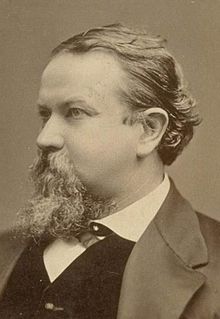Milton S. Latham
| Milton Latham | |
|---|---|
 |
|
|
United States Senator from California |
|
|
In office March 5, 1860 – March 3, 1863 |
|
| Preceded by | Henry P. Haun |
| Succeeded by | John Conness |
| 6th Governor of California | |
|
In office January 9, 1860 – January 14, 1860 |
|
| Lieutenant | John G. Downey |
| Preceded by | John B. Weller |
| Succeeded by | John G. Downey |
| Member of the U.S. House of Representatives from California's at-large district |
|
|
In office March 4, 1853 – March 3, 1855 |
|
| Preceded by | Edward C. Marshall |
| Succeeded by | James W. Denver |
| Personal details | |
| Born |
May 23, 1827 Columbus, Ohio |
| Died | March 4, 1882 (aged 54) New York City, New York |
| Political party | Lecompton Democrat |
| Spouse(s) | Sophie Birdsall |
| Alma mater | Jefferson College |
| Profession | Lawyer, politician, teacher |
Milton Slocum Latham (May 23, 1827 – March 4, 1882) was an American politician, and served as the sixth governor of California and as a member of the federal U.S. House of Representatives and U.S. Senate. Latham holds the distinction of having the shortest governorship in California history, lasting for five days between January 9 and January 14, 1860. A Lecompton Democrat, Latham became the second governor to resign in office after being elected by the legislature to fill the U.S. Senate vacancy following the death of David C. Broderick from a duel.
Born in Columbus, Ohio in 1827, Latham was educated in classical studies at Jefferson College in Washington, Pennsylvania, graduating in 1845. Following his graduation, Latham moved to Russell County, Alabama, working briefly as a school teacher while studying law. He was admitted to the Alabama State Bar in 1848, working as Russell County's circuit court clerk for two years until 1850, when he relocated to San Francisco, California following the gold rush.
In San Francisco, Latham continued in law, becoming a recording clerk for the county, and in 1851, the district attorney of Sacramento. After serving for one year, Latham entered politics, and in 1852, ran as a Democrat and won a seat in the U.S. House of Representatives. After the completion of his two-year term, Latham declined to run for another term and returned to California to again practice law, despite being renominated by state Democrats.
...
Wikipedia
